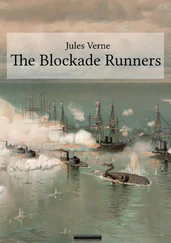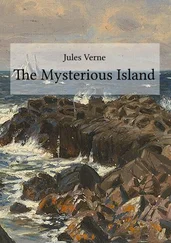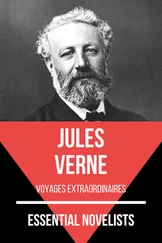Was I resigned? No, not yet. Yet the cool morning air and the scenes on the road, rapidly changed by the swiftness of the train, drew me away somewhat from my sad reflections.
As for the Professor’s reflections, they went far in advance of the swiftest express. We were alone in the carriage, but we sat in silence. My uncle examined all his pockets and his travelling bag with the minutest care. I saw that he had not forgotten the smallest matter of detail.
Amongst other documents, a sheet of paper, carefully folded, bore the heading of the Danish consulate with the signature of W. Christiensen, consul at Hamburg and the Professor’s friend. With this we possessed the proper introductions to the Governor of Iceland.
I also observed the famous document most carefully laid up in a secret pocket in his portfolio. I bestowed a malediction upon it, and then proceeded to examine the country.
It was a very long succession of uninteresting loamy and fertile flats, a very easy country for the construction of railways, and propitious for the laying-down of these direct level lines so dear to railway companies.
I had no time to get tired of the monotony; for in three hours we stopped at Kiel, close to the sea.
The luggage being labelled for Copenhagen, we had no occasion to look after it. Yet the Professor watched every article with jealous vigilance, until all were safe on board. There they disappeared in the hold.
My uncle, notwithstanding his hurry, had so well calculated the relations between the train and the steamer that we had a whole day to spare. The steamer Ellenora, did not start until night. Thence sprang a feverish state of excitement in which the impatient irascible traveller devoted to perdition the railway directors and the steamboat companies and the governments which allowed such intolerable slowness. I was obliged to act chorus to him when he attacked the captain of the Ellenora upon this subject. The captain disposed of us summarily.
At Kiel, as elsewhere, we must do something to while away the time. What with walking on the verdant shores of the bay within which nestles the little town, exploring the thick woods which make it look like a nest embowered amongst thick foliage, admiring the villas, each provided with a little bathing house, and moving about and grumbling, at last ten o’clock came.
The heavy coils of smoke from the Ellenora’s funnel unrolled in the sky, the bridge shook with the quivering of the struggling steam; we were on board, and owners for the time of two berths, one over the other, in the only saloon cabin on board.
At a quarter past the moorings were loosed and the throbbing steamer pursued her way over the dark waters of the Great Belt.
The night was dark; there was a sharp breeze and a rough sea, a few lights appeared on shore through the thick darkness; later on, I cannot tell when, a dazzling light from some lighthouse threw a bright stream of fire along the waves; and this is all I can remember of this first portion of our sail.
At seven in the morning we landed at Korsor, a small town on the west coast of Zealand. There we were transferred from the boat to another line of railway, which took us by just as flat a country as the plain of Holstein.
Three hours’ travelling brought us to the capital of Denmark. My uncle had not shut his eyes all night. In his impatience I believe he was trying to accelerate the train with his feet.
At last he discerned a stretch of sea.
“The Sound!” he cried.
At our left was a huge building that looked like a hospital.
“That’s a lunatic asylum,” said one of or travelling companions.
Very good! thought I, just the place we want to end our days in; and great as it is, that asylum is not big enough to contain all Professor Liedenbrock’s madness!
At ten in the morning, at last, we set our feet in Copenhagen; the luggage was put upon a carriage and taken with ourselves to the Phoenix Hotel in Breda Gate. This took half an hour, for the station is out of the town. Then my uncle, after a hasty toilet, dragged me after him. The porter at the hotel could speak German and English; but the Professor, as a polyglot, questioned him in good Danish, and it was in the same language that that personage directed him to the Museum of Northern Antiquities.
The curator of this curious establishment, in which wonders are gathered together out of which the ancient history of the country might be reconstructed by means of its stone weapons, its cups and its jewels, was a learned savant, the friend of the Danish consul at Hamburg, Professor Thomsen.
My uncle had a cordial letter of introduction to him. As a general rule one savant greets another with coolness. But here the case was different. M. Thomsen, like a good friend, gave the Professor Liedenbrock a cordial greeting, and he even vouchsafed the same kindness to his nephew. It is hardly necessary to say the secret was sacredly kept from the excellent curator; we were simply disinterested travellers visiting Iceland out of harmless curiosity.
M. Thomsen placed his services at our disposal, and we visited the quays with the object of finding out the next vessel to sail.
I was yet in hopes that there would be no means of getting to Iceland. But there was no such luck. A small Danish schooner, the Valkyria , was to set sail for Rejkiavik on the 2nd of June. The captain, M. Bjarne, was on board. His intending passenger was so joyful that he almost squeezed his hands till they ached. That good man was rather surprised at his energy. To him it seemed a very simple thing to go to Iceland, as that was his business; but to my uncle it was sublime. The worthy captain took advantage of his enthusiasm to charge double fares; but we did not trouble ourselves about mere trifles. .
“You must be on board on Tuesday, at seven in the morning,” said Captain Bjarne, after having pocketed more dollars than were his due.
Then we thanked M. Thomsen for his kindness, “and we returned to the Phoenix Hotel.
“It’s all right, it’s all right,” my uncle repeated. “How fortunate we are to have found this boat ready for sailing. Now let us have some breakfast and go about the town.”
We went first to Kongens-nye-Torw, an irregular square in which are two innocent-looking guns, which need not alarm any one. Close by, at No. 5, there was a French “restaurant,” kept by a cook of the name of Vincent, where we had an ample breakfast for four marks each (2 s . 4 d .).
Then I took a childish pleasure in exploring the city; my uncle let me take him with me, but he took notice of nothing, neither the insignificant king’s palace, nor the pretty seventeenth century bridge, which spans the canal before the museum, nor that immense cenotaph of Thorwaldsen’s, adorned with horrible mural painting, and containing within it a collection of the sculptor’s works, nor in a fine park the toylike chateau of Rosenberg, nor the beautiful renaissance edifice of the Exchange, nor its spire composed of the twisted tails of four bronze dragons, nor the great windmill on the ramparts, whose huge arms dilated in the sea breeze like the sails of a ship.
What delicious walks we should have had together, my pretty Virlandaise and I, along the harbour where the two-deckers and the frigate slept peaceably by the red roofing of the warehouse, by the green banks of the strait, through the deep shades of the trees amongst which the fort is half concealed, where the guns are thrusting out their black throats between branches of alder and willow.
But, alas! Gräuben was far away; and I never hoped to see her again.
But if my uncle felt no attraction towards these romantic scenes he was very much struck with the aspect of a certain church spire situated in the island of Amak, which forms the southwest quarter of Copenhagen.
Читать дальше












